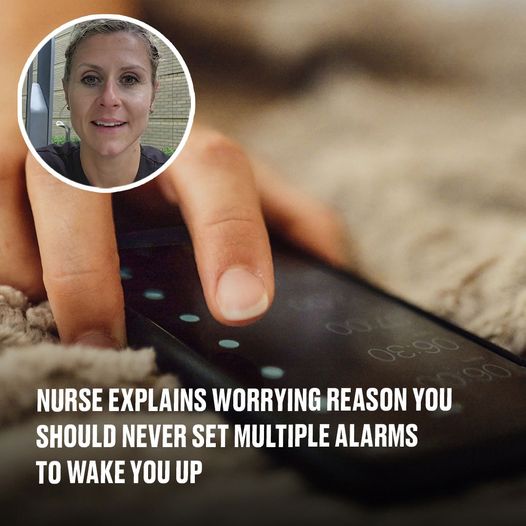Many people rely on multiple alarms to wake up in the morning, thinking that it helps them ease into their day. However, according to healthcare professionals and sleep experts, this practice may be doing more harm than good. Nurse Jordan Bruss, among other experts, has highlighted the detrimental effects of setting multiple alarms. Here’s why you should consider breaking this habit.
The Impact on REM Sleep

Nurse Jordan Bruss took to TikTok to explain how setting multiple alarms can seriously disrupt your sleep cycle, particularly the REM (Rapid Eye Movement) phase, which is crucial for cognitive functions like memory processing and creative thinking. According to Bruss, waking up multiple times can fragment your sleep, preventing you from completing essential REM cycles. This leads to what is known as sleep inertia—a state of grogginess and disorientation that can last for hours after waking up.1
Bruss warns, “Waking to multiple alarms every morning can really disrupt your REM cycle, frequently. This can actually cause sleep inertia, increased drowsiness, fatigue, mood swings, and it also raises your cortisol levels”. The first alarm of the morning often breaks the REM cycle, and each subsequent alarm further fragments it, leaving you feeling less rested despite having spent more time in bed.
The Psychological Stress of Multiple Alarms

Waking up repeatedly to alarms isn’t just physically disruptive; it’s psychologically taxing as well. Each alarm triggers the body’s fight-or-flight response, which increases stress levels. “Every time your alarm goes off, you’re in that fight or flight response. Waking up like that multiple times in the morning is very stressful. So, when that alarm goes off in the morning, get up,” Bruss advises. This continuous stress can elevate cortisol levels, a stress hormone, which can have long-term health implications, including weight gain, anxiety, and depression.
Expert Opinions on Sleep Fragmentation

Dr. Brandon Peters, a neurologist and sleep medicine physician, echoes Bruss’s concerns. He explains that sleep in the last hours of the night is predominantly REM sleep, which is vital for brain function. Interrupting this phase by hitting the snooze button or setting multiple alarms undermines the quality of sleep. “It’s satisfying in the moment to hit the snooze and delay getting out of bed and starting the day, but it does actually fragment and undermine that sleep quality”, says Peters.2
Dr. Cathy Goldstein, a sleep medicine physician, adds that frequent alarm usage might indicate underlying sleep deprivation. Many who set multiple alarms might be struggling with sleep disorders like sleep inertia, making it harder to wake up to a single alarm. However, the root of the issue often lies in not getting enough sleep to begin with.
Long-Term Sleep Health and the Circadian Rhythm

Bruss and other experts suggest that instead of relying on multiple alarms, individuals should focus on improving their sleep hygiene and regulating their circadian rhythm, which is the body’s natural clock. A consistent sleep schedule, combined with a healthy lifestyle, can help the body wake up naturally, feeling more refreshed and less dependent on alarms.3
Nurse Bruss recommends setting just one alarm at the time you actually need to wake up and resisting the urge to snooze or set multiple alarms. This allows for a more restful, uninterrupted sleep, which is crucial for maintaining energy levels throughout the day. By focusing on better sleep habits, you can improve your overall well-being and reduce the need for multiple alarms.
Conclusion

The habit of setting multiple alarms may seem harmless, but it can have significant negative effects on both your physical and mental health. From disrupting REM sleep to increasing stress levels, the drawbacks outweigh the temporary comfort of hitting the snooze button. As Nurse Jordan Bruss and other sleep experts suggest, adopting better sleep practices and sticking to a single alarm can lead to more restful and restorative sleep, setting a positive tone for the day ahead.
